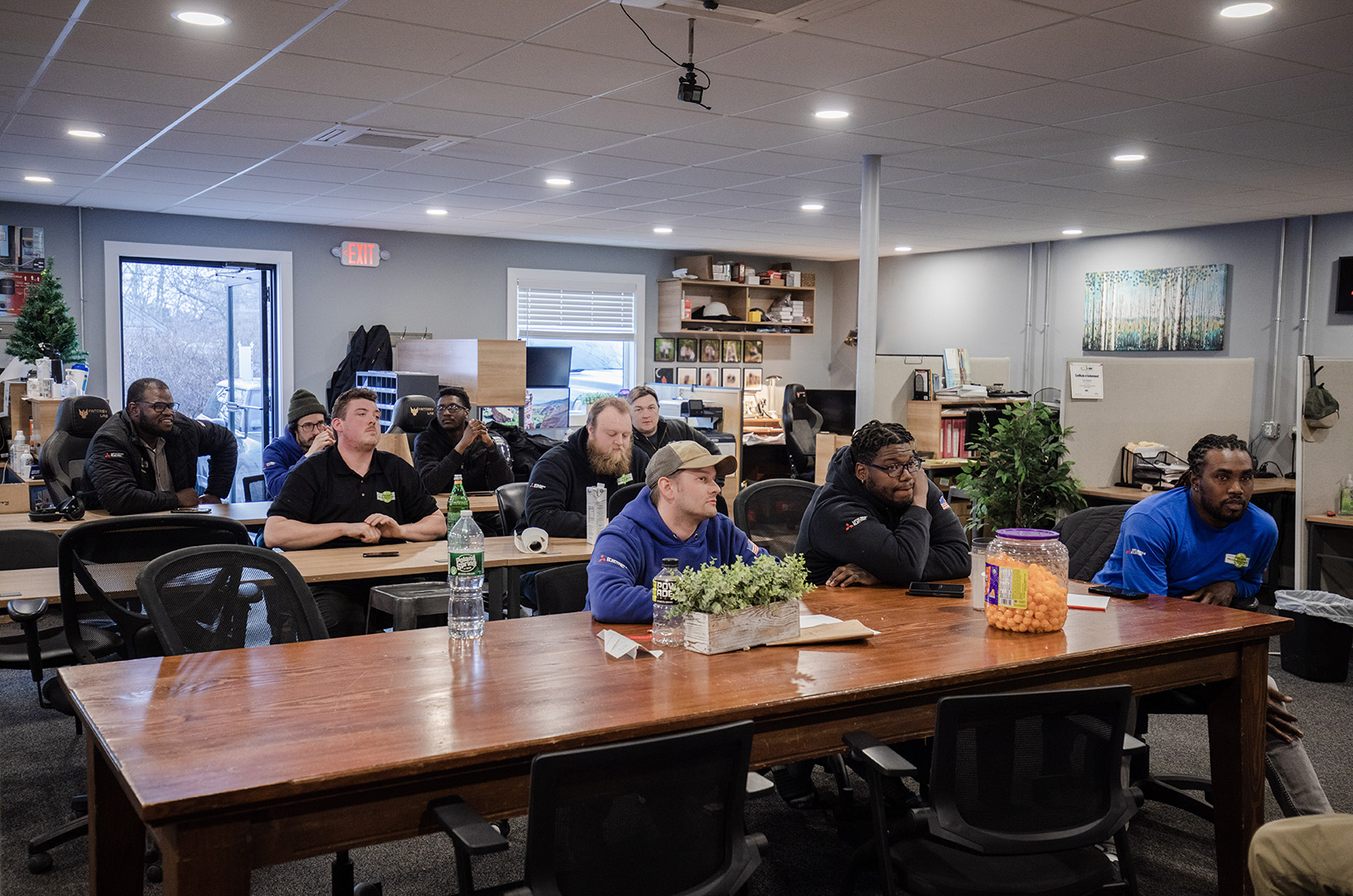HVAC technicians in Mitsubishi-branded sweatshirts gathered recently for class at Nelson’s Mechanical Design headquarters. The office was open-concept, designed to have a “Google-type atmosphere,” according to co-founder David Sprague.
The tradesmen were ebullient that evening, having almost completed the long process to achieve sheet metal licensure they began in September. Mr. Sprague, the instructor, sat at the front, quizzing students on four-foot plenums, battery-operated vacuum pumps and variable speed compressors.
After nearly 150 hours of training, the exhaustion didn’t show through.
“I try to keep it interesting,” said Mr. Sprague, in an interview with the Gazette. “I mean, I remember being in trade school, working the day and class at night...it’s tiring.”
Sheet metal licensure is generally necessary for anyone who wants to move air in the state of Massachusetts, from the smallest bath fan to the largest heating, ventilation and air conditioning (HVAC) system. Until recently, there was no place on-Island to get the license.
“Guys had to drive onto the ferry, call that an hour, plus drive another hour to the class, then spend three hours in class, then come back to the Island, on top of working all day,” Mr. Sprague said.
Though he was at first hesitant to take on the huge time commitment that teaching the course would require, Mr. Sprague said the scale of Island HVAC had made such training more necessary in recent years, as the need for Island HVAC work continues to grow and the technology becomes more complex, 20 newly minted sheet metal licensees at Nelson’s will have their work cut out for them.
Brian Nelson, co-founder with Mr. Sprague of Nelson’s Mechanical, sports a teal jumpsuit, a thin white soul patch and a bubbly personality. In a corner of the open-concept office, Mr. Nelson illustrated he and Mr. Sprague’s journey with his finger on a digital whiteboard.
“When we started out David and I, we were doing plumbing. And we were doing oil boilers. And that’s all there were...few people had AC,” he said.
The duo founded their company back in 2004, turning their focus to the then-emerging heat pump technology. In the most basic terms, a heat pump exchanges warm air outside with cold air inside (or vice versa) to regulate temperature. Internal coils filled with freon, pressurized and depressurized, amplifies the temperature differential.
The entire process runs on electricity, a major factor in the promotion of the technology on the state level, Nick Lucas, head of the mini split department, explained.
“Massachusetts is trying to be fossil fuel free in all residential homes by 2040,” he said, outlining the range of state and regional grant funding programs now in progress.
To meet that goal, Mr. Nelson said, heat pumps are the only viable technology.
“This is a directive at the highest level of the state directing the course...of the HVAC industry in a way that it’s never done before.”
But even as state efforts to promote these systems have ramped up, Mr. Nelson said, the regulatory infrastructure needed for the switch has lagged. As opposed to the Massachusetts plumbing code, one of the most stringent in the country, regulations on HVAC installations are much laxer. Subpar installations have led to a host of flawed pumps on-Island, he said, leading to low public confidence in the product. The issue is compounded by the increasing complexity of now heavily computerized systems
“It’s been this huge blind spot,” said Mr. Nelson. “The idea is, right now, it’s legal to do it incorrectly.”
Although the course focuses on the basics, Mr. Sprague said he supplemented it with other topics in HVAC, and his employees also undertake optional trainings from the manufacturers.
Currently, only three Island towns (Tisbury, West Tisbury and Oak Bluffs) require a sheet metal license for installers. But as state-level discussions to update HVAC code and license requirements proceed, Mr. Nelson and Mr. Sprague decided to get a jump on licensing all their employees, who they hope will be grandfathered into the new system.
With thousands of installation and upgrade jobs cued up on the Island, and a nine-month backlog on mini-split projects, they said they can’t afford to waste any time. And learning doesn’t end in the classroom for an HVAC technician.
“Every day I get to learn something different and learn something new,” Mr. Lucas said. “The fact that I go to a home and hook up my laptop computer and run program analysis, I never thought I was going to do something like that. I thought I was going to be literally swinging a hammer for the rest of my life.”








Comments (3)
Comments
Comment policy »